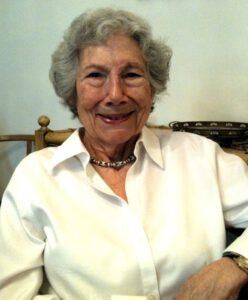If you don’t know who Evelyn Witkins is perhaps you should.

Evelyn Witkin.
A legendary figure in genetic science, the 94 year-old professor emerita at Rutgers University was awarded in September a Lasker Prize for Basic Medical Research, sometimes referred to as “America’s Nobel.”
We here at the blog neglected to make note of the award that Witkins shares with fellow scientist Stephen Elledge of Brigham Women Hospital, for their separate discoveries around the “DNA-damage response” – a mechanism that protects DNA against the onslaught of everyday life, whether by chemical, biological or other environmental exposures.
Witkins began her work in the early 1940s at Cold Spring Harbor looking at genetic mutations in bacteria.
When she eventually moved from Cold Spring Harbor to Rutgers, she continued to do genetics research with bacteria and studied how DNA responded to UV radiation. This led her to her work on DNA repair and what she later identified as the DNA-damage response, which was the first “coordinated cellular stress response to be elucidated.”
Stephen Elledge built on that early work first studying the DNA damage response in yeast but moving onto studying this response in human cells and the role it plays in the development of cancer and degenerative disorders.
In an interview with the New York Times, Witkins described her time at Cold Spring Harbor, as a magical time in genetics. Her love of science also comes through in the interview particularly when she described the day she attended the first demonstration on how the genetic code worked, and then later that evening going to a performance of Handel’s “Messiah.”
“I tell you I had the same feeling of exultation that I had in that talk about the genetic code,” she said.


